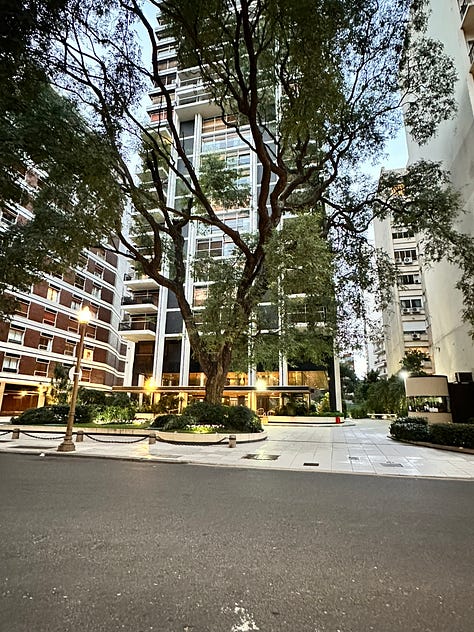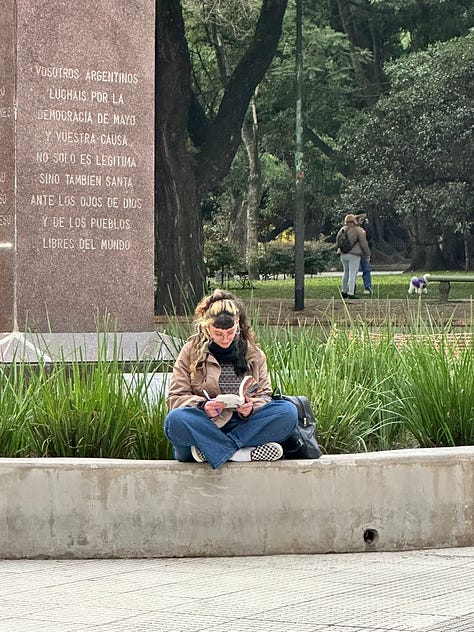Theology #2 The Lament
Let's Lament! The secret is "complaining" with love - and not "about God" but "to God". Listenting to: M83's Wait
Lamenting is a fact, a cornerstone of human existence.
Are we capable of joy?
Then surely the lament will come.
A Yin to a Yang, a Ginger Rogers to a Fred Astaire, a long-legged Cyd Charise to a Gene Kelly, it is the other side of a coin, the other dancer, the thing-sure-to-come because suffering and pain are woven into this fabric we call life.
The question is, when the lament comes -do we let the feeling fester or do we speak it? Is speaking the complaint (lament) something that will grieve God’s heart? Is it the mark of ungratefulness? An Israel complaining about Mana miraculously pouring over them in the desert?
Should we not express this feeling aloud, it will undoubtedly become an audible grumble. This I know. We will voice the complaint it in due time, this frustration that rises out of our throats and into the world. And that is sin.
Let’s recall a simple definition of sin: an action (or thought) that separates us from God because it runs contrary to all the Good that He is.
Complaints will separate us from God like nothing else. An ungrateful heart turns the world dingy and unsalvageable. We begin to grumble and the unavoidable next step is anger, despair. Hopelessness.
But not all complaints are of the same breed.
There are those uttered with beauty, with acts of thanksgiving. A type of complaint spoken in love.
A complaing not about God but to God.
This is the Lament.
And God encourages it.
How do we Lament, then?
Psalm 142 NLT
A psalm[a] of David, regarding his experience in the cave. A prayer.
1 I cry out to the Lord;
I plead for the Lord’s mercy.
2 I pour out my complaints before him
and tell him all my troubles.
3 When I am overwhelmed,
you alone know the way I should turn.
The Hebrew verb for pour out in verse 2, is "shaphak"1 (שָׁפַךְ). It can refer to a literal pouring of a liquid (or blood) as well as the pouring of the soul in a complaint.
The word complaint, in the same verse, comes from the Hebrew masculine noun “siyach” (שִׂיחַ)2 which can be translated as babbling, communication, complaint, meditation, prayer, talk. The King James translation also translates the word as commune3, which is one of my favorite words in English.
Commune speaks of an intimate spiritual connection with another. It is one soul speaking to another; thoughts and emotions being fully grasped and delighted in.
Siyach ocurrs thirteen times in Scripture. It is fascinating to think of the lexicon God allows for the verbal expression of the soul (mind). We can babble, complain, meditate, pray and talk. Commune.
To God or to others.
It is the demarcation of what He allows as good communication.
Yelling is not Siyach. Insulting is not Siyach.
But complaining is.
What is it you’re weary of tolerating? Of going through?
What is it you think is unfair and painful?
Turn that into a Lament before God.
Before is the key word. Not about, not to others, but to God. Privately.
Psalm 55:17 NLT
Morning, noon, and night I cry out in my distress, and the Lord hears my voice.
I don’t call my friends to cry out in distress. I tell the Lord. And I rest in knowing He hears me.
He hears me.
And then, when my soul has been quieted from having spent time with my God, I might (or might not) call a friend, go for coffee and tell her what I’ve been struggling with.
But do I complain about God?
No.
I will speak to my friend about this over a nice Luongo, and I will make sure to let her know that I find peace in His promises of deliverance.
This is God-honoring: the trust and the love I show in my words about God to others.
Psalm 13 NLT
For the choir director: A psalm of David.
1 O Lord, how long will you forget me? Forever?
How long will you look the other way?
2 How long must I struggle with anguish in my soul,
with sorrow in my heart every day?
How long will my enemy have the upper hand?3 Turn and answer me, O Lord my God!
Restore the sparkle to my eyes, or I will die.
How long?
Answer me.
Turn to me.
I will die from this sorrow, this anguish unless You do something.
As Rick Warren puts it, “complaining about God is rebellion, complaining to God is an act of worship.”
Perhaps no Psalm can illustrate a Lament with such clarity as Psalm 88.
Psalm 88
For the choir director: A psalm of the descendants of Korah. A song to be sung to the tune “The Suffering of Affliction.” A psalm[a] of Heman the Ezrahite.
1 O Lord, God of my salvation,
I cry out to you by day.
I come to you at night.
2 Now hear my prayer;
listen to my cry.
3 For my life is full of troubles,
and death[b] draws near.
4 I am as good as dead,
like a strong man with no strength left.
5 They have left me among the dead,
and I lie like a corpse in a grave.
I am forgotten,
cut off from your care.
6 You have thrown me into the lowest pit,
into the darkest depths.
7 Your anger weighs me down;
with wave after wave you have engulfed me. Interlude
8 You have driven my friends away
by making me repulsive to them.
I am in a trap with no way of escape.
9 My eyes are blinded by my tears.
Each day I beg for your help, O Lord;
I lift my hands to you for mercy.
10 Are your wonderful deeds of any use to the dead?
Do the dead rise up and praise you? Interlude
11 Can those in the grave declare your unfailing love?
Can they proclaim your faithfulness in the place of destruction?[c]
12 Can the darkness speak of your wonderful deeds?
Can anyone in the land of forgetfulness talk about your righteousness?
13 O Lord, I cry out to you.
I will keep on pleading day by day.
14 O Lord, why do you reject me?
Why do you turn your face from me?
15 I have been sick and close to death since my youth.
I stand helpless and desperate before your terrors.
16 Your fierce anger has overwhelmed me.
Your terrors have paralyzed me.
17 They swirl around me like floodwaters all day long.
They have engulfed me completely.
18 You have taken away my companions and loved ones.
Darkness is my closest friend.
Let us not forget that Psalms are the soundtrack of man as he relates to God.
(I use “man” as a generic term)
The Psalms are songs that express gratitude, worship, beauty, but also, despair, anger, confusion, sorrow, lament.
All the emotional spectrum, the prism of our feeling lies within the Psalms.
We lift our emotion to God as a fundamental part of our relationship with Him.
We trust Him with our sorrow. We tell Him our joys.
That, right there, is worship.
God, folks, loves music.
Step Two
The Lament is the first step in the process of stating my case before God.
We can Lament, yes. But are we not to take action as well?
Do we not want God to move in our favor?
Job 13:3
NLT
3 As for me, I would speak directly to the Almighty.
I want to argue my case with God himself.
Job 13:15
The Message (Eugene Peterson)
15 Because even if he killed me, I’d keep on hoping.
I’d defend my innocence to the very end.
The key word here is “argue”. A Lament leads to an appeal. We argue with God. We wrestle. We ask. We defend our posture before God. Our sorrow, the unfairness we feel was placed upon us.
We appeal. And we do it well, that is, with respect and love.
Job 13:20-28
New Living Translation
Job Asks How He Has Sinned
20 “O God, grant me these two things,
and then I will be able to face you.
21 Remove your heavy hand from me,
and don’t terrify me with your awesome presence.
22 Now summon me, and I will answer!
Or let me speak to you, and you reply.
23 Tell me, what have I done wrong?
Show me my rebellion and my sin.
24 Why do you turn away from me?
Why do you treat me as your enemy?
25 Would you terrify a leaf blown by the wind?
Would you chase dry straw?26 “You write bitter accusations against me
and bring up all the sins of my youth.
27 You put my feet in stocks.
You examine all my paths.
You trace all my footprints.
28 I waste away like rotting wood,
like a moth-eaten coat.
We appeal to the character of God and remind Him of His promises.
We remind Him of who He is.
God, did you not…?
God, are you not…?
2 Chronicles 20: 5-9
5 Then Jehoshaphat stood up in the assembly of Judah and Jerusalem at the temple of the Lord in the front of the new courtyard 6 and said:
“Lord, the God of our ancestors, are you not the God who is in heaven? You rule over all the kingdoms of the nations. Power and might are in your hand, and no one can withstand you. 7 Our God, did you not drive out the inhabitants of this land before your people Israel and give it forever to the descendants of Abraham your friend? 8 They have lived in it and have built in it a sanctuary for your Name, saying, 9 ‘If calamity comes upon us, whether the sword of judgment, or plague or famine, we will stand in your presence before this temple that bears your Name and will cry out to you in our distress, and you will hear us and save us.’
God, did you not part the Red Sea?
Surely you can *insert desired outcome here*…
because I am *insert Lament and sorrowful feeling here*…
Step Three
We end by expressing our trust in God.
The most important marker of love is that we end on the high note.
We Lament, yet we also Praise. It is easy to praise when on a mountaintop, but praise in the dark valley is proof of our faith and absolute trust.
And so, after the Lament come our words of hope, surrender, love. For we know God has heard us and will move in our favor.
Psalm 142
NLT
Then I pray to you, O Lord.
I say, “You are my place of refuge.
You are all I really want in life.
6 Hear my cry,
for I am very low.
Rescue me from my persecutors,
for they are too strong for me.
7 Bring me out of prison
so I can thank you.
The godly will crowd around me,
for you are good to me.”
Psalm 13
But I trust in your unfailing love.
I will rejoice because you have rescued me.
6 I will sing to the Lord
because he is good to me.
We can weep, but in our souls we know we are loved and fully known.
Habakkuk 3:17-19
NLT
17 Even though the fig trees have no blossoms,
and there are no grapes on the vines;
even though the olive crop fails,
and the fields lie empty and barren;
even though the flocks die in the fields,
and the cattle barns are empty,
18 yet I will rejoice in the Lord!
I will be joyful in the God of my salvation!
19 The Sovereign Lord is my strength!
He makes me as surefooted as a deer,[a]
able to tread upon the heights.(For the choir director: This prayer is to be accompanied by stringed instruments.)
Folks, we have no control over anything. We have free will, yes. We make our own decisions as we walk (or perhaps meander) through life.
Yet, we do not have the power to change the heart of another, to open doors of opportunity that have shut before us, to make time run faster so what we wait for with hope can come to pass.
Our bodies are at the mercy of processes we do not understand, that we cannot reverse and biology that can break down at any moment.
We are but a whisper fading after utterance.
A small pinkish hue that lingers in the afterglow of a sunset.
We can be gone in an instant.
We have no control.
But God says the very hairs on our head are numbered.
Luke 12 NLT
6 “What is the price of five sparrows—two copper coins[b]? Yet God does not forget a single one of them. 7 And the very hairs on your head are all numbered. So don’t be afraid; you are more valuable to God than a whole flock of sparrows.
So, wouldn’t we want to surrender it all to the One who does have control?
Rick Warren says that the only task we can never be fatigued by is surrender.
And so our Lament should end with surrender.
On a personal note (because these are personal essays):
I’ve been learning to utter this prayer:
“God whatever it is I need, that is what I want.”
Because the human heart (mind) is a trickster, it is likely we do not know what we need. Our desires, instead of blessing us, could become a curse.
Jeremiah 17:9 NIV
The heart is deceitful above all things and beyond cure. Who can understand it?
The One who controls it all, who knows the number of breaths we have left, the strands of hair on our heads… the One who has good plans for our lives, He knows what it is we need on our earthly pilgrimage.
What He desires to give will always bless us.
Jeremiah 29:11
New International Version
11 For I know the plans I have for you,” declares the Lord, “plans to prosper you and not to harm you, plans to give you hope and a future.
Romans 8:26-28
The Message
26-28 Meanwhile, the moment we get tired in the waiting, God’s Spirit is right alongside helping us along. If we don’t know how or what to pray, it doesn’t matter. He does our praying in and for us, making prayer out of our wordless sighs, our aching groans. He knows us far better than we know ourselves, knows our pregnant condition, and keeps us present before God. That’s why we can be so sure that every detail in our lives of love for God is worked into something good
Praise to the One who is able to do more than we can ever hope for or imagine.
The One who loves us with an unbreakable love, a love eternal.
Ephesians 3:20
20 Now all glory to God, who is able, through his mighty power at work within us, to accomplish infinitely more than we might ask or think.
Romans 8:38-29
38 And I am convinced that nothing can ever separate us from God’s love. Neither death nor life, neither angels nor demons,[b] neither our fears for today nor our worries about tomorrow—not even the powers of hell can separate us from God’s love. 39 No power in the sky above or in the earth below—indeed, nothing in all creation will ever be able to separate us from the love of God that is revealed in Christ Jesus our Lord.
Listening to: M83’s Wait
When M83 hit it big with Midnight City in 2011, they didn’t initially think much of the song. It wasn’t representative of what they were about at the time.
The synth riff gave the track an indelible mark and the sax solo was such a surprising addition at a time when sax solos were a thing of the past.
And what a solo!
But they nodded their head, enjoyed the economy of it and stated that the other tracks were more “them”. As in mellower, shoegazier, less EDM.
I read that somewhere and cannot find it. So trust me on this.
Wait is a track that falls into the more ambient side of M83: ethereal, reverby vocals, a guitar, synth, the drums that kick in at mid song - Anthony Gonzalez singing “no time, no time”.
It is pieced together beautifully.
Go have a listen.
Buenos Aires Moments
Two days ago, I went for a walk in one of my favorite neighborhoods: Retiro.
Filled with lush Petit Hotels and Hotels Particuliers (private palaces) on streets decorated with luminaries and trees, nothing beats the beauty of Retiro.
And Arroyo street has some of the loveliest cafés and art galleries in Buenos Aires.









https://biblehub.com/hebrew/8210.htm
https://biblehub.com/hebrew/7898.htm
https://biblehub.com/hebrew/7878.htm




